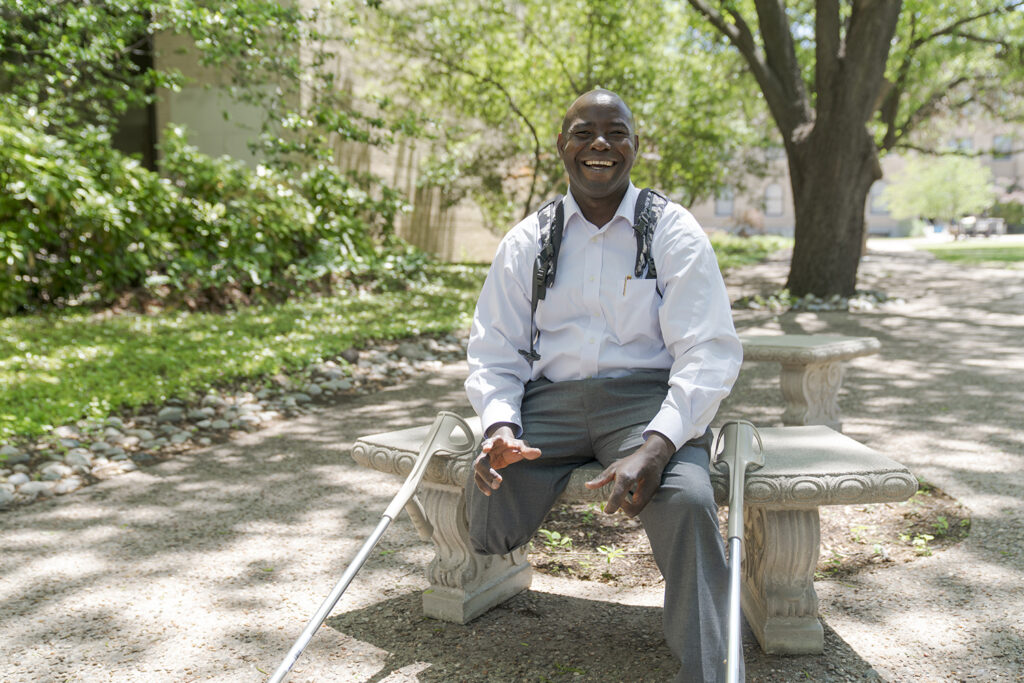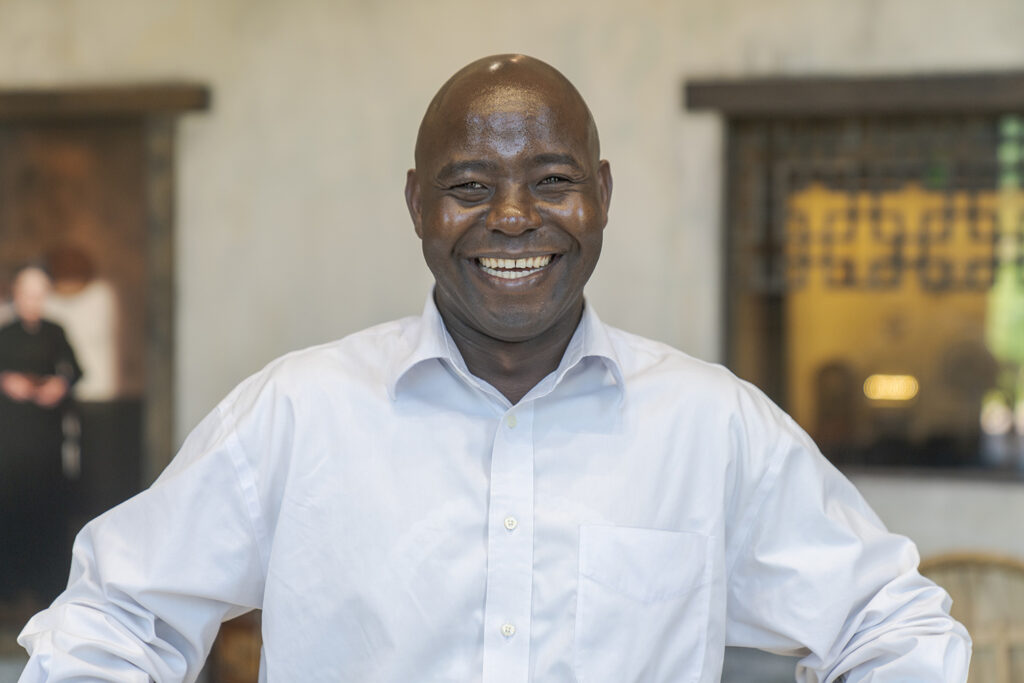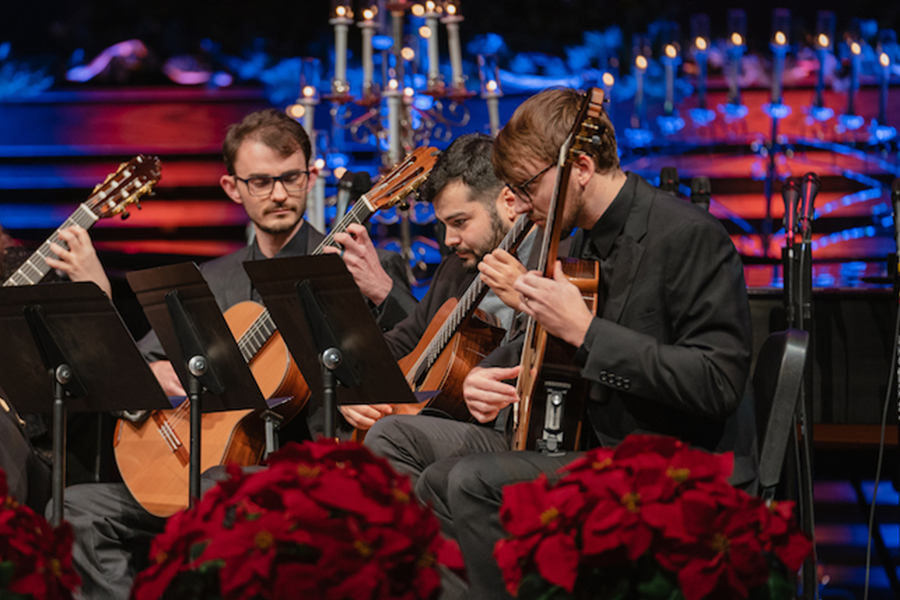In Christ alone: One student’s story of finding hope after a lifetime of trials


Editor’s note: The following feature story originally appeared in the spring 2021 issue of Southwestern News.
Cyprien Yamuragiye was born crippled in the African nation of Rwanda, his hands and feet deformed and his right eye closed. He would become an outcast to the family and village that feared him, and his young life was marked by countless trials, trauma, and hopelessness. Any god who created him, Cyprien once thought, must be cruel.
“How can God be loving?” he asked. “How can the God who made me this way be merciful?”
Despite living with a sense of despair from a young age, Cyprien’s life now testifies to the miraculous work of the God who does love him and has saved him. Cyprien ultimately encountered that love and hope found in Christ alone, and is now being trained at Southwestern Baptist Theological Seminary to fulfill his calling to spread the Good News of the Gospel to others also in search of hope.
At the time of his birth, Cyprien’s parents assumed him to be an animal born in human form. But not knowing what animal, they named him “Yamuragiye,” meaning “Unknown.”
Cyprien was beaten by his own parents and was eventually cast out from his family. He began a homeless life at age 6, forced to live on the streets and in markets begging for food and water. People who encountered Cyprien feared him, however, and most would not approach him. Others spit on him and beat him.
Cyprien remembers those years as ones of despair and grief. He struggled to survive and only encountered people who feared him. Believing their lies that he was sub-human, Cyprien says that between the ages of 8 and 10, he believed there was no longer any reason to live and attempted to commit suicide.
“But God saved me from myself,” Cyprien says.
Soon after his suicide attempt, Cyprien experienced kindness for the first time when a Muslim woman came to his village and found him begging in the street.
“Somehow compassion and pity was put in her heart,” Cyprien says, remembering the day he says he was treated like a human for the first time in his life.
The woman invited Cyprien to live with her and her children and was able to provide him food and shelter for a brief time. She struggled to provide for her own children, so she eventually brought Cyprien to a Catholic orphanage.
The mocking of his disabilities and an unknown birthday continued at the orphanage, so to create some sense of humanity, Cyprien decided to claim January 1, 1980, as his birthday. Although the humiliation continued, Cyprien was grateful for a safe place to receive food and shelter.
But then, in 1994, genocide came to Rwanda and started another period of suffering for Cyprien.
“At the time, identity was a matter of life,” Cyprien says. “In my case, I had no identity, and I couldn’t find myself to be one of any ethnic group, so I was beaten by both sides.”
As a result of the injuries sustained, one of Cyprien’s legs had to be amputated. To this day, he says he also lives with the effects of post-traumatic stress disorder and chronic headaches.
Despite the horrors of the genocide, Cyprien says the Lord protected him and used “good Samaritans” to save him and send him with other severely injured children to an Italian hospital. After three years, Cyprien returned to Rwanda, again homeless.
Then came a turning point in Cyprien’s life. While receiving treatment in a Rwandan hospital, he met Rosalie, a Pentecostal woman who was in the hospital with her disabled child.
Rosalie spent much of her time sharing the Gospel with patients, including Cyprien. But during those first conversations, Cyprien outright rejected the message she preached. “How could a good God allow such horrible circumstances in my life?” he thought.
“Maybe He is merciful to you,” he told Rosalie, “but He’s not merciful to me.”
“I wrongly thought, ‘How can He give me eternal life if He can’t even give me hands and legs?’” Cyprien says.
Despite Cyprien’s dismissal of the Gospel, Rosalie persisted in her conversations with him and continued to pray for his salvation.
“She knew I needed to hear the truth of the Gospel,” Cyprien says. “She kept on and made sure I could hear it.”
Through Rosalie’s acts of kindness and commitment to share, Cyprien slowly became more receptive to the Gospel message.
“There was this thing that was very powerful that I could not deny,” Cyprien says. “She was not perfect, but she lived according to what she believed. I could see the love of God in her life and toward me and others around her. It was very difficult for me to deny that God is love, because I could see that love in her life day by day.”
Through the work of the Holy Spirit, Cyprien says his view of God began to change. He finally accepted that, through Christ alone, he could find salvation and hope. In 2000, Cyprien made the decision to follow Christ and was later baptized.
From the moment of his salvation, Cyprien says he began to see an immediate transformation. He now had a joyful countenance and newfound hope.

The transformative change compelled him to share the Good News with others, including his parents and the Muslim woman who first took him in a decade prior. He immediately believed his life’s calling was to share and preach the Gospel.
As Cyprien became more vocal about his faith in Christ, he was often detained, beaten, and imprisoned. The next decade would follow a similar pattern as he traveled throughout Africa sharing the Good News of Christ. However, this often put him at opposition with countries and their governments.
As he traveled to such countries as Uganda, Egypt, and Sudan, he was threatened with violence, frequently put in jail, and was eventually given 48 hours to leave Sudan.
Cyprien fled the country through Egypt and traveled to Israel, where he was detained for a brief time because of his entering the country through the Sinai Peninsula. Despite his time in jail, Cyprien says he was allowed to share the Gospel with both prisoners and guards who would ask him about his story.
Cyprien’s arrival in Israel marked another turning point in his life. He was increasingly eager to receive education for spiritual growth and theological knowledge so that he could more effectively share the Gospel. He was confident in his calling but did not yet know how to pursue such a calling.
It was ultimately a Jewish lawyer who, despite being atheist, connected Cyprien with a local pastor and a yearlong program at the Israel College of the Bible. The program was instrumental in his spiritual growth, Cyprien says, but he still wanted additional education.
As Cyprien began to share his testimony to churches in Israel, Larry and Anita Ladehoff, an American couple who were living and working in Israel, heard Cyprien’s story and were immediately drawn to his joyful countenance. They formed a fast friendship and even invited Cyprien to live in their basement apartment for a time.
“While living with us, he pursued opportunities to share his story of God’s redemption in his life, in churches, and even synagogues throughout Israel,” Anita says. “He was well received and well loved.”
When the Ladehoffs learned of Cyprien’s desire to grow in theological knowledge, they were compelled to assist him in that effort. Through their connections with friends who attended Southwestern Seminary, they were able to help Cyprien enroll in the seminary and facilitate his move to the United States in 2017 to begin his studies in the Master of Divinity program.
“I was preaching the Word of God, but I wanted to learn more and knew I needed good theology so I could fulfill my calling,” Cyprien says. “I was not necessarily looking for a school in the United States, but I was definitely looking desperately for a good theology school, and God led me to Southwestern Seminary.”
Since 2017, Cyprien has continued to grow in his faith, his evangelism efforts, and his theological education. He says this can largely be credited to the support of Southwestern Seminary students and faculty, including Malcolm B. Yarnell III, research professor of theology.
Yarnell says Cyprien is an example of a Christian who turns his personal and physical limitations into Gospel opportunities.
“In Rwanda, his name means ‘Unknown,’ but Cyprien has this incredible ability to make Jesus ‘known,’” Yarnell says. “That he has a difficult physical handicap and that he has witnessed a horrific genocide—these things do not inhibit him. Rather, they enable him to tell people about Jesus.”
One of the ways in which Cyprien has been able to grow as an evangelist is through frequent participation in the seminary’s “Everyday Evangelism” efforts, which includes teams going door to door in local neighborhoods to share the Gospel. Matt Queen, L.R. Scarborough Chair of Evangelism, says he has had the opportunity to witness Cyprien’s evangelistic fervor during these efforts.
“When I have evangelized with Cyprien in our ‘Everyday Evangelism’ outings, I feel as though I am evangelizing with one of the heroes of the faith,” Queen says. “He not only shares the Gospel, he has made significant sacrifices for the Gospel.”
Cyprien explains that although he enjoys evangelizing on his own, he especially enjoys doing group evangelism and learning from other people.
“The more you do it, the better you become and more comfortable you are,” he says. “That’s all I can do, is to learn and practice what I’m learning.”
In recent years, Cyprien has connected with other believers in Rwanda to start a ministry to reach people with the Gospel, and he hopes to return one day to facilitate the work there. This ministry team in Rwanda has connected with Cyprien’s parents, and in 2018, he received word that they responded to the Gospel and made the decision to follow Christ.
His church, Southcliff Baptist Church in Fort Worth, has been instrumental in supporting his current and future ministry work. Pastor Carroll Marr (’84) says they are working to establish a nonprofit evangelism ministry, Christ My Only Hope, through which Cyprien will eventually facilitate his ministry in Rwanda.
“Cyprien is a man who knows God intimately and knows Him through suffering,” Marr says. “I think he has come to understand the joy of entering into the suffering of Christ. And few of us ever have the opportunity to experience God in that way.”
Marr is also writing a book detailing Cyprien’s life story and testimony. All proceeds from the book, which he hopes to release this fall, will support Cyprien’s ministry. Updates for the book and his ministry will be shared on ChristMyOnlyHope.com.
Cyprien says his time at Southwestern Seminary has helped him pursue his calling, giving him the tools and knowledge he needs.
“God can use unlearned people, but learning is always best,” Cyprien says. “I knew I needed to learn, and I wanted to find a good school where I could learn what was right. We don’t have to be perfect in everything we do, but when it comes to the Word of God, I think we have to be very serious, because our life depends on it.
“It’s a blessing to learn from others, and I think [Southwestern Seminary] is the perfect place to be because it helps me in my calling.”
Katie Coleman is a news writer at Southwestern Seminary.



